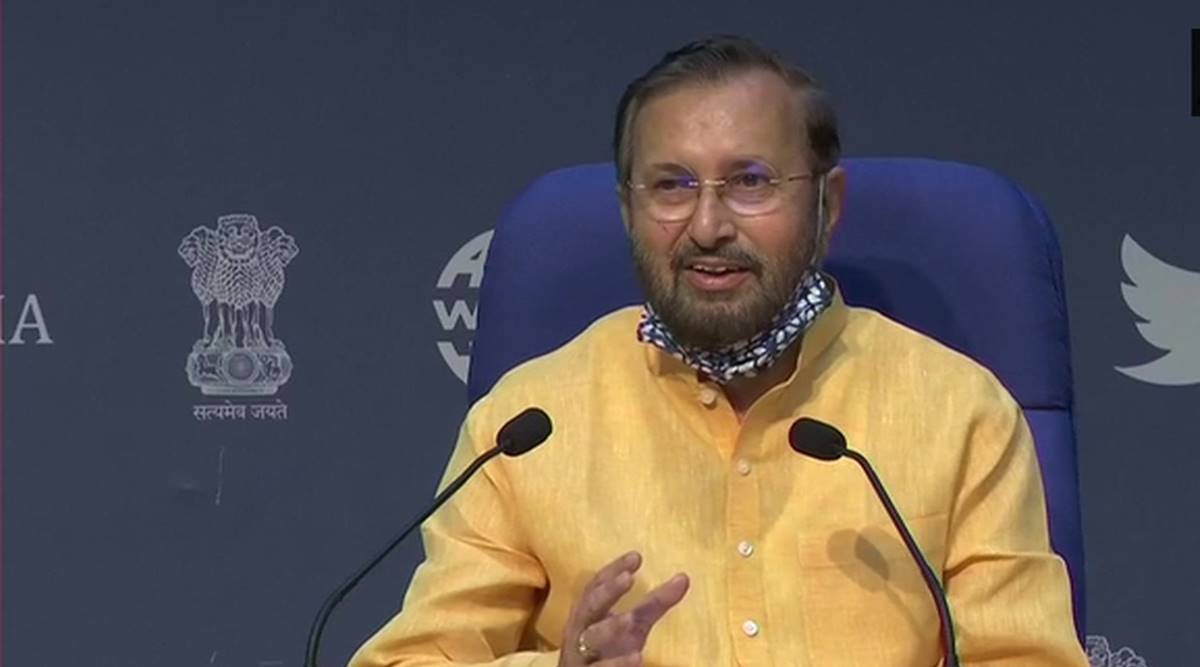Prakash Javadekar called the “freedom of the press” as the “soul of democracy”. But, he said, “the freedom of press is not limitless”.
The government is mulling over strengthening the regulatory mechanisms for the news media in the country, and is also considering a new code of conduct for television. Union Information and Broadcasting Minister Prakash Javadekar said on the National Press Day that the government does not want to interfere, but some of the regulatory issues are being considered by his ministry.
Speaking at a webinar organised by the Press Council of India, Javadekar spoke about the different regulatory systems available for print and television news, and need for such a system for the online platforms. “The freedom of the press is being discussed again today, and I said that the way the press freedom is being attacked, that is not good,” said the minister.
“Press Council of India is another mechanism of self-regulation. Though the head is appointed by the government, but it has representatives of press owners, editors, journalists, photographers and parliamentarians. But people are demanding that the Press Council should be given more powers. That is also being considered.” Javadekar said.
Talking about TV news, he said that “there is no Press Council like system for TV channels, so there should be self-regulation for that” and mentioned that “there is one institution, and anyone can complain to them and they even punish the erring channels”. National Broadcasting Standards Authority is the self-regulatory body for TV news channels.
“But there are many channels that are not even members of that,” Javadekar said, adding that “they have no restrictions”. “Such a system cannot exist. People are suggesting us that we should also come up with a code of conduct which is common for all channels. We have not taken a decision, but we are considering it as well.”
Regarding online platforms or Over the Top (OTT) platforms, the I&B Minister said that “there neither a Press Council like system for them, nor is there any self-regulation”.
He said while there is some very good content on some of them, there are “some bad and some very bad” films and shows too. “Because of this, there too what can be done, people are suggesting and we are listening,” he said and added that the ministry gets “many letters every day and we consider them all.”
Though he mentioned that the government is thinking about these “challenges”, he added, “I believe press personnel should themselves take the lead, should institutionalise a principle of responsible freedom”. For that, he said that “all the systems should be improved, and (media personnel) should accept the challenge of making them work properly”.
“The government does not want to interfere in it, and does not want to restrict any freedom, but this is your responsibility, that if government has faith in you should set an example of responsible freedom, responsible journalism.”
On the issue of alleged manipulation of the Television Rating Points (TRP), Javadekar said that the committee created by the I&B Ministry to look into how the system can be strengthened will give its report soon. The four-member committee was created on November 4 and will be headed by the Prasar Bharati CEO Shashi Shekhar Vempati.
Javadekar said the Broadcast Audience Research Council (BARC) is a body of advertisers, advertising agencies and broadcasters. “The government deliberately never interfered with it, because if the advertiser and the broadcaster are on the same page then why should we come in between”.
However, he added, “now the time has come that we have to interfere” and he mentioned the committee. “Earlier there used to be 5000 meters, that is why there was manipulation. If there is a system to capture the choices of 1 crore people, so how will there be any manipulation,” he said.
“How to kill the possibility of manipulation, we have created a committee for it, and it will not take too much time and will give a report soon on what is possible,” Javadekar mentioned.
He called the “freedom of the press” as the “soul of democracy”. But, he said, “the freedom of press is not limitless”.
He stated that journalism should be responsible, and while the work being done can be criticised, “but if the editor and journalists have personal dignity, even the common person has it”.
Speaking at the same event earlier Vice President M Venkaiah Naidu said that the “press in India has always been the vanguard of protecting and strengthening the foundations of democracy” and mentioned that “robust free and vibrant media is as important as independent judiciary in consolidating democracy and strengthening constitutional rule of law”.
“Democracy cannot survive without a free and fearless press,” Naidu said and added “therefore any attack on the freedom of the press is detrimental to national interest and should be opposed by one and all”. He asked the media “to be fair, objective and accurate in its reporting”.
During the event, on “the role of media in Covid-19 pandemic and its impact on media”, President Ram Nath Kovind and Prime Minister Narendra Modi shared written messages and appreciated the role played by the media in the fight against Covid-19 in the country.
Source: Read Full Article


